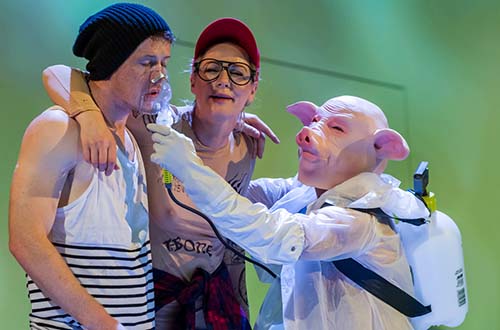PEER GYNT [recycled]
By Eli Kent
Directed by Colin McColl
Auckland Theatre Company
ASB Waterfront Theatre, Auckland March 7-18 2017
Reviewed by Leigh Sykes, 10 Mar 2017
Image Credits: Michael Smith
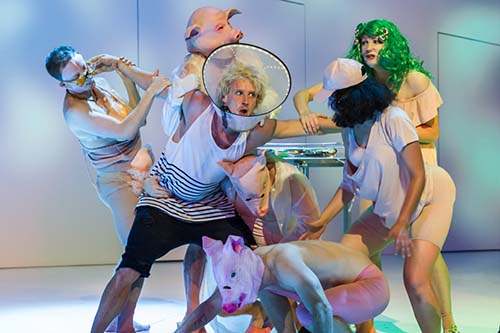
In his programme notes, Director Colin McColl describes Ibsen's Peer Gynt as “a long dramatic poem”; a “sprawling, picaresque masterpiece” which “is unstageable”. Overall, McColl disproves this latter point, with inventive and visually arresting staging that supports uniformly strong performances from a cast that works beautifully as an ensemble. Having already directed an acclaimed production of Emily Perkins' adaptation of A Doll's House in 2015, McColl admits to being fascinated by Ibsen, and particularly the troll that lies at the heart of Ibsen's characters. The concepts of the self and the troll are at the heart of this adaptation by Eli Kent, alongside an investigation of the nature of theatre itself. This is a resolutely post-modern, meta-theatrical play that tackles themes that resonate powerfully with the currently very prevalent culture of narcissism and self-interest.
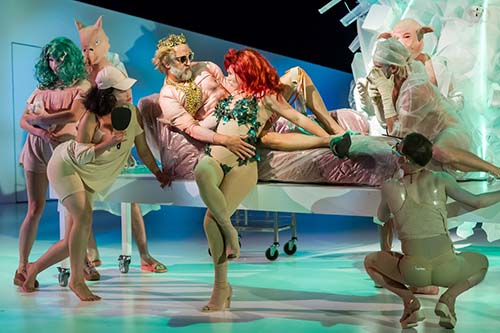
The play begins with ‘Eli' (Jack Buchanan as a scarily faithful visual representation of the playwright) addressing the audience to tell us about his reasons for, and struggles with, writing the play. Buchanan is engaging and open, interacting naturally with the audience and making us feel immediately included. He admits that adapting a play that is ‘super old and super Norwegian' is a difficult task, even leading him to seek advice from his Mum and secretly record the conversations so that we can then have the transcripts read to us (by Lisa Chappell). There are plenty of laughs in this opening section, as the audience recognises and appreciates a number of pop-culture references that will be re-visited as the play goes on. We then jump straight into Peer Gynt's story (played during this section by Oscar Wilson) as we first see him attending the wedding of an ex-girlfriend. Wilson is full of energy and slick dance moves, performing with great commitment and enthusiasm. As the bride-to-be, Ella Gilbert is feisty and raunchy, while Benjamin Henson, Adam Gardiner and Brynley Stent are great fun as the guests who are far more interested in themselves than in the events of the wedding. Although Peer is unable to stop himself from wrecking the wedding, he does meet Sol (played with sincerity and charm by Ana Scotney) before taking off to seek his next adventure. Eli returns to tell us more about his journey through adapting the play, and the pattern for the rest of the first half of the play is set. There are some very clever uses of projection (AV design by Simon Barker) during Eli's interaction with the audience and in the following scenes, and the set (designed by John Parker) is used intelligently and creatively throughout the show.
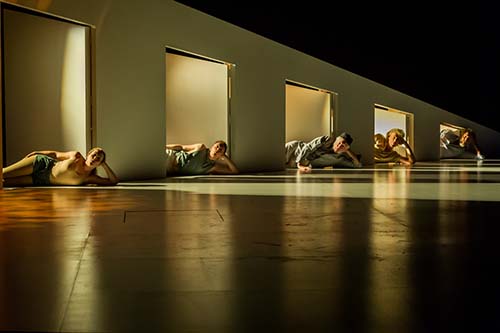
The first half continues to move at a cracking pace, with each section inventively and entertainingly staged, while all of the actors remain uniformly energetic and committed to each moment. A favourite section for me in this half of the show is Peer's encounter with a sexy troll princess (Ella Gilbert) and her family. The level of energy and grotesquery in this scene is pitched beautifully, and it's clear that the audience is enjoying the scene a great deal. The scene manages to reference Michael Jackson along with a number of other modern preoccupations, while all of the performers embrace the sleaziness and unashamed self-absorption of the troll world, making for a wonderfully realised world within the world of the play. The whole first half of the show feels fresh and relevant and fun. Scenes move quickly, with plenty of visual and performance highlights: Peter Hayden as the implacable Boyg; Brynley Stent as Huhu the Norwegian translator; Benjamin Henson as a bratty Troll child … And, another real highlight for me, the many and various members of the Ibsen Appreciation Society storming the stage just as we think the first half is finishing. This half finishes with an unexpected appearance and sets up a new direction for after the interval. I love this first half of the show. It is clever in all the right ways, making us think about the nature of theatre and what is at the core of self. I love the clean lines and flexibility of the set, and I particularly like the orb that is full of plastic and unidentifiable items, and which suggests different things in different scenes. The show is exciting and relevant and the performances are uniformly excellent, so that the first half of the show seems to pass in no time at all and the interval is spent in eager anticipation for what will happen next.
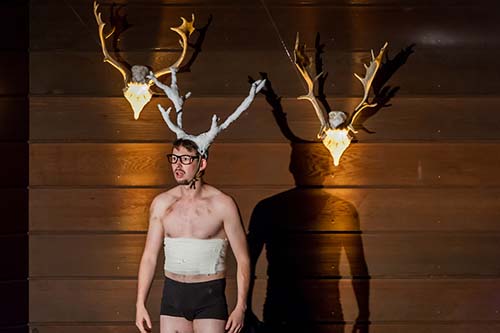
The second half begins with Ibsen himself (Peter Hayden) joining Eli to debate the success (or not) of what has been done to his play. Ibsen's view that “to live is to war with trolls in heart and soul; to write is to sit in judgement of oneself” is (very literally) writ large over this half of the play, meaning that the atmosphere is very different now, as Ibsen questions Eli's intentions and relationship with his inner troll. With the change of atmosphere comes a change of pace, which means that Peer's breakneck journey slows down and takes on more internalised aspects, as the nature of writing and judging now comes to the fore. The result for me is that the second half feels very much longer than the first.
The exuberance of the first half is replaced by a more sombre and questioning tone, as both Eli and Peer become more anxious about the direction the play is taking. It almost feels like Ibsen's dissatisfaction with the treatment of his play pervades the play itself.
The first scene is set in a Californian retreat where Peer (now played by Jordan Mooney) is seeking enlightenment with ‘the soulless woman'. There are some sharp observations here, but the scene feels longer than it needs to be.
A short, but visually stimulating scene at an airport then takes us to a later stage of Peer's life (now played by Adam Gardiner), where he is now a successful entrepreneur, negotiating to have a book written about himself as he takes in the pleasures of Dubai. This scene feels the most forced, introducing the character of alt-right journalist, Milo Yiannopoulous, to demonstrate how up-to-the-minute the writing is. For me it does little to advance the contemplations that occupy Eli and Ibsen. Ana Scotney's disgruntled Starbucks worker creates some tension, but like the preceding scene, this one also feels long.
As the rest of the play unfolds, I struggle to engage with scenes that should represent the crux of the themes being explored. The concept of the Button Moulder, who threatens to melt Peer down with the rest of the masses, should be the most relevant representation of the theme of finding the absolute essence of self in a play that has itself melted down and re-fashioned Ibsen's play.
Perhaps the inventiveness and joie de vivre of the first half of the show interferes with my ability to engage with the more cerebral contemplations of its second half, and I find that I struggle to enjoy this part of the play and to focus on the points that are being made. The writing cleverly re-visits and wraps up some of the references from the first half of the play (James Cameron's appearance is unexpected but fun), although I feel that there are a number of points at which the play could have ended before we reach the actual conclusion.
At well over three hours, this is a very long play. There is a great deal to admire and enjoy here, with the audacity and invention of the first half of the play being some of the most enjoyable theatre I have ever seen. For me, the very different tone and pace of the second half of the play does not create the same quality of experience. Although it feels extraordinarily presumptuous for me to say so, I feel that the play would benefit from some revisions to the second half, particularly in the interactions between Eli and Ibsen.
As the result of a very ambitious project, the show has some extremely successful elements, which create some remarkable, but currently uneven experiences for the audience.
